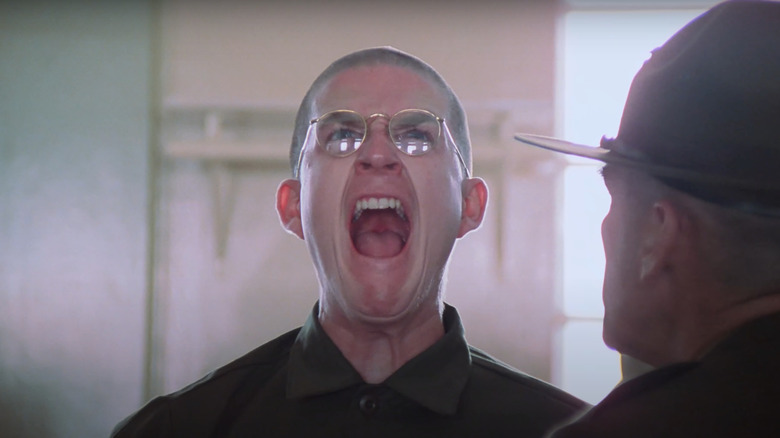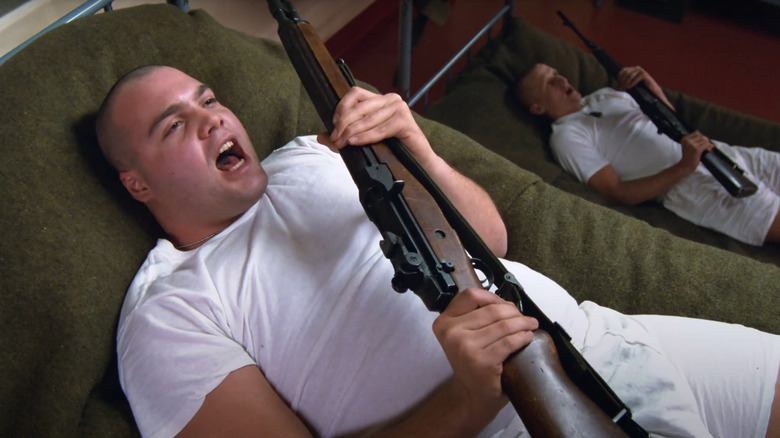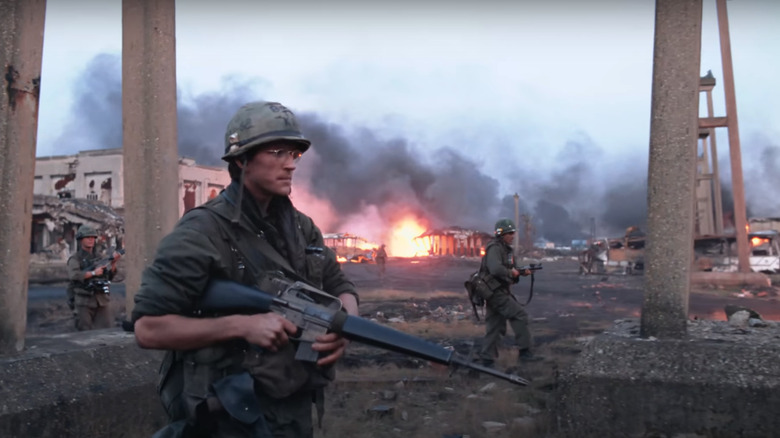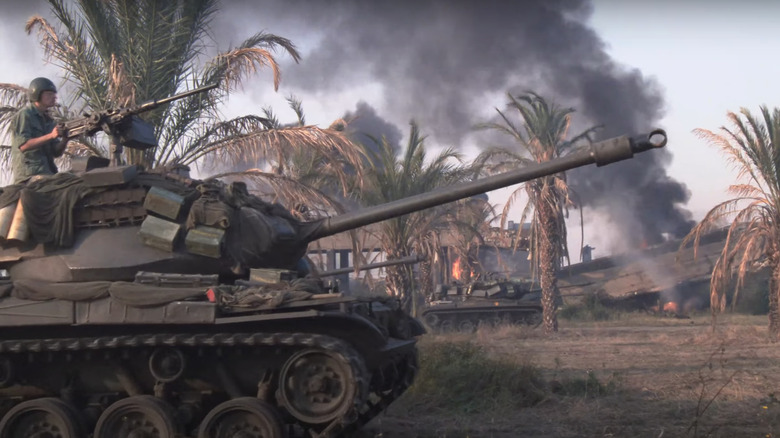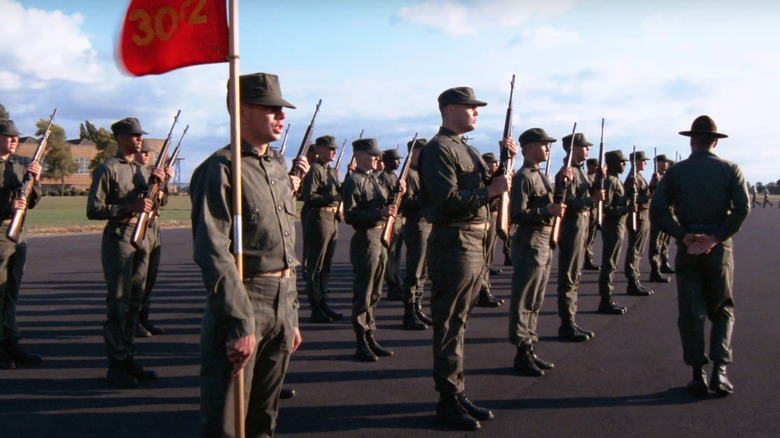Full Metal Jacket's Original Author Wasn't Happy With What He Saw On Stanley Kubrick's Set
For all his originality, Stanley Kubrick sure loved using other people's work. Almost all his films are based on pre-existing stories, which, rather than undermining his talent as a director, simply formed a part of his specific filmmaking method. Kubrick sought out inspiration like it was his life-source — which, in a way, it was. The legendary auteur needed a good story to get him excited enough to make a film. And without films, who knows what would have become of the bookish boy from the Bronx.
Back in 1987, just as the director's celebrated Vietnam War drama "Full Metal Jacket" was opening in theaters, the New York Times noted how Kubrick would use the time before starting work on his next project to "catch up on 18 months of missed movies, good and bad, and read as ever with the hope of finding another story." That story would be one he'd been planning on adapting for some years — Arthur Schnitzler's "Traumnovelle" which formed the basis for 1999's "Eyes Wide Shut." But whether he found it on one of his regular trawls through the pages of the Virginia Kirkus Review or revisited an idea he'd had in mind for decades, the story was always the most important part.
So it was with "Full Metal Jacket," which was based on Gustav Hasford's 1979 novel "The Short-Timers." Hasford was an ex-Marine combat correspondent who did a tour in Vietnam and served with the 1st Marine Division during the 1968 Tet Offensive. "The Short-Timers" was a retelling of his Vietnam experience, which Kubrick found to be a "unique, absolutely wonderful book," and immediately worthy of being given the classic Kubrick adaptation treatment. Little did he know that his "unique" take on the material would prove more than a little contentious for the original author.
The genesis of Full Metal Jacket
Gustav Hasford's novel had been praised not so much for its characters or plot but for its stark detail, which painted a vision of the Vietnam War that could only have come from a man who'd been in the thick of Indochina's historic bloodbath. The military journalist had written drafts of the novel during his time in the country, typing up early versions between firefights and borrowing character names from his Marine companions. He'd even been involved in the 1968 battle of Huế, which would form a large part of Stanley Kubrick's eventual adaptation.
The director was taken by Hasford's vivid depictions of military life in 'Nam, and according to Hasford, spent hours on the phone discussing not just the story, but "just about any subject you could think of." Kubrick had, during the course of his life-long quest for inspiration, found multiple other ideas which he could have pursued, including an adaptation of Brian Aldiss' "Supertoys Last All Summer Long" which he'd began developing prior to taking on "The Shining" back in the '70s. That sci-fi tale would again take a back seat, however, once Kubrick turned his attention to Hasford's evocative war novel.
At some point during the string of lengthy phone calls between author and director, the adaptation became a sure thing, and Hasford, then out of the military, "working as a security guard [and] living in his car," was finally about to make some decent money. He was also about to make things difficult for his new director friend, who would draft in yet another writer with direct experience of the Vietnam War to work on the screenplay: "Dispatches" author Michael Herr. And this is where things start to take an unfortunate turn ... depending on who you ask.
War breaks out
If you asked Gustav Hasford (he died in 1993), he would have told you that he "worked on the screenplay for four years" and had written entire scenes. According to the writer, Stanley Kubrick would have Michael Herr write alternate versions of those same scenes, but either way, Hasford claimed to have written a version of them. That's on top of the almost daily phone calls he would have with the director, and the in-person visit between all three collaborators at Kubrick's UK home.
However, Kubrick had a different perspective on Hasford's contribution, leading to a dispute over the novelist's credit on the movie. The director and Warner Bros. wanted to give him an "additional dialogue" credit but Hasford fought them and was eventually named co-screenwriter. But it wasn't just his writing contributions that proved controversial.
Filming got underway in and around London in 1985, with Kubrick, who lived near the English capital, insisting on using various locales near his Hertfordshire country home. The most significant set was constructed at the derelict Beckton Gas Works on the banks of the Thames. Production designer Anton Furst and his team would create their own version of a war-ravaged Huế at the disused site, and Hasford took it upon himself to pay the ambitious production a visit.
Riding towards the sound of the guns
According to Gustav Hasford's friend Grover Lewis, writing in the LA Times about the "Full Metal Jacket" saga, the author "hadn't been invited onto the team as such [...] but [Stanley] Kubrick hadn't discouraged his visit, either." A fan of General Custer's phrase ("The only thing you have to know to be a soldier is to be able to ride toward the sound of the guns"), Hasford remained undeterred by Kubrick's lack of enthusiasm. He had been in the UK since 1984 to collaborate on the film and once shooting got underway, he "wanted to see in fact whether the picture was being made."
Already contemplating legal action over the credit situation, the writer took a couple of his friends to the Beckton set — a, quite literally, toxic place — "dressed up in tiger-stripe clothes" to try to sneak in as extras. According to John Baxter's biography of Kubrick, once there, Hasford "wasn't happy with what he saw, nor the changes wrought by Kubrick and Herr." Baxter's book also relates how Hasford apparently ramped up his efforts to gain appropriate credit on the film following his set visit and, according to author Lisa Tuttle, was "going to screw everything up for no reason."
The reason seems clear. Hasford felt he had contributed more than Kubrick was willing to admit. But his impromptu set visit seemed to have made things worse. If anything, it sounds like Kubrick should have been the one who was upset, considering he had "extended [Hasford] an invitation to drop in sometime, but left the details carefully vague" Alas, the novelist found his way there, and it seems the fabricated Huế and plastic palm trees didn't quite cut it for the man who'd experienced the real thing.
Kubrick and Hasford needed each other
Talking about his overall approach to the sets in "Full Metal Jacket, production designer Anton Furst said, "We weren't going for complete historical accuracy [...] It was supposed to be the image of hell." Despite the fact that Stanley Kubrick had pored over thousands of photos of the real Vietnam, Furst preferred not to "look too hard at references," opting for a "broad stroke" approach that captured the essence of the scene.
Gustav Hasford, on the other hand, seemed like a real stickler for accuracy, especially considering his novel's lurid, chaotic, detailed description of the war. Perhaps he took exception to Furst's more interpretive approach. Or perhaps the marine had no patience for Kubrick who according to numerous people, including Furst, could be a very difficult man to work with. As the production designer put it, "If you can handle it with Kubrick then they think you can handle anything because he's 44 times more difficult than anybody else."
Or, it could be that his years spent in 'Nam and living out of his car had taken a toll on Hasford. The writer had, according to Grover Lewis' LA Times piece, "no contract" and "no agent or other representation." Meaning, he was kicking up all this fuss without having secured basic protections for himself and his work. Regardless, his work, along with Michael Herr, Kubrick, Furst, and everyone else involved in "Full Metal Jacket," was truly worth it, having culminated in one of the most affecting and widely celebrated depictions of military life and the Vietnam War in film history. Ultimately, Kubrick needed Hasford and his story, just as much as Hasford needed Kubrick to bring his vision to a wide audience.
